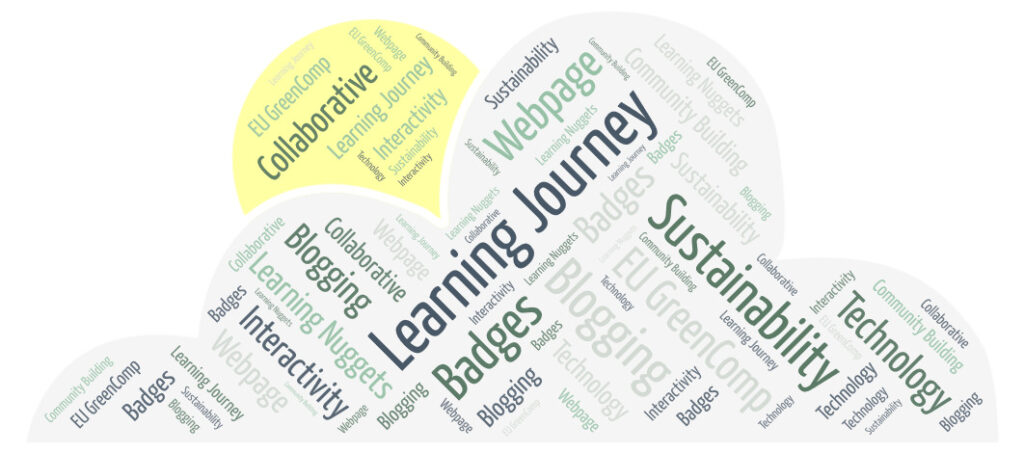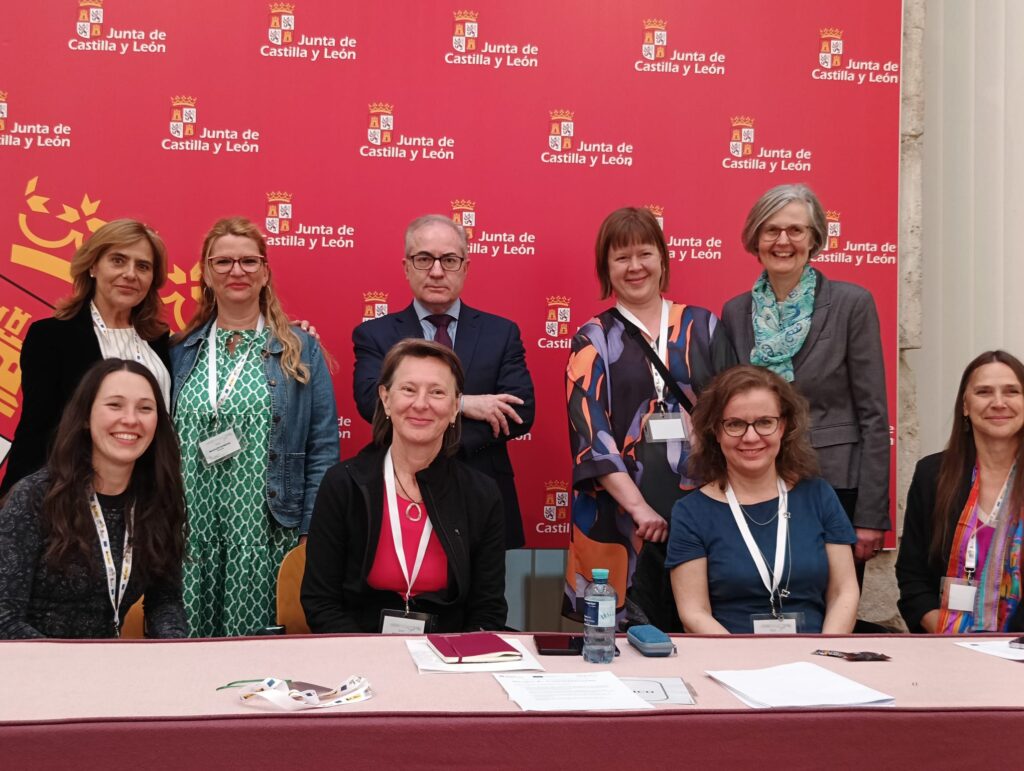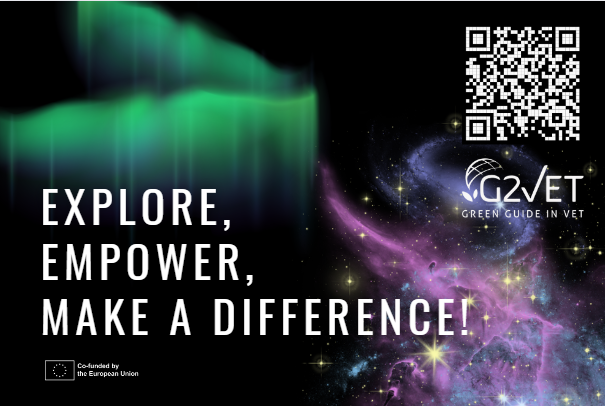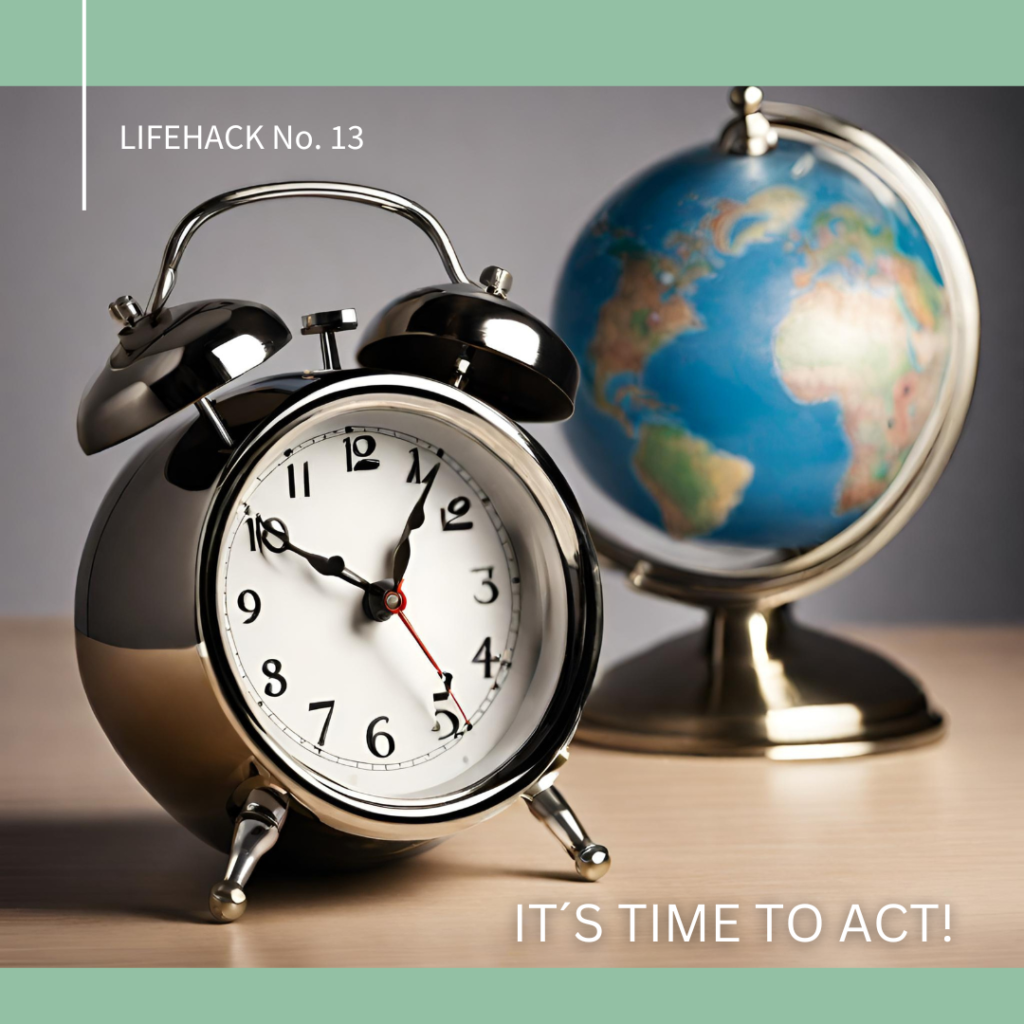Looking back on 18 intensive months of the G2VET learning journey
A great experience in learning, working, trying out and presenting together
After 18 intensive months, our G2VET project is coming to an end. As a project team, we would like to take you on a journey through our experiences, challenges and insights. Our aim was not only to understand sustainability as a concept, but also to find practical ways of integrating it into the everyday professional and private lives of employees in vocational education and training and to find colleagues in our educational institutions to join us on this journey.

The steps on our learning journey: From idea to impact
Before January 2023 | Starting point: An idea for change
We recognised the urgent need to promote sustainable thinking and action in our educational institutions thus we applied for the project. Our goal: to build a community that integrates sustainability into everyday life and learning.
January – February 2023 | Kick-off meeting: aligning perspectives and developing visibility
At the first meeting, we brought together our diverse perspectives and laid the foundations for our shared understanding of sustainability. This first learning event allowed us to enter the first learning phase and develop an initial work plan. We designed a visibility for the project and agreed on the logo and a design guide.
March – June 2023 | Prepare ourselves: Iterative learning and experimentation
During this phase, we dived deep into the technical aspects and tackled challenges such as creating an engaging website, producing interactive content and developing an effective blog strategy to engage learners and build a community. Through shared knowledge, discovery and trial and error, we developed our technical and creative skills using tools such as WordPress, H5P, translation, management tools and design software. We explored OERs and open licences, discussed the feasibility of integrating a learning management system into our project and explored the EU GreenComp framework:
- Researching the GreenComp EU: We developed an understanding of sustainability and sustainability competence in education based on the GreenComp EU.
- Focus on assessment of sustainability competence: A key question we addressed was how to effectively assess sustainability competence. Our Spanish project team developed specific recommendations for teachers in vocational education and training, which they disseminated in the Castilla y León community. These recommendations were also translated into German and English and are now available as an important project result.
- Development of self-reflection tools: We recognised the importance of self-reflection for the development of sustainability literacy. Therefore, we subsequently developed several life hacks that enable users to reflect on the role of sustainable thinking and action in everyday life (LifeHack No. 3), to explore their own sustainability competences based on the EU GreenComp framework (LifeHack No. 20B), to question the sustainability of their internet use for educational purposes (LifeHack No. 21)
July 2023 – June 2024 | Community building and iterative approach
We focussed on building a sustainability community. To do this, we planned challenges, customised sustainability activities, workshop opportunities for our facilities and an advent calendar to engage a wider audience. We agreed a common, skills-orientated workflow between partners and refined our approach to focus on practical sustainability ‘life hacks’ that relate to both the personal and professional environment.
A key element of our iterative approach was the monthly online meetings. These served as a platform to continuously reflect on our actions and adapt them to our goals. Particularly important milestones in this process were
- After 6 months (June 2023): Refocusing activities on the goal of community building and planning specific measures such as the challenge idea and the Advent calendar
- After 12 months (January 2024): The review and assessment of our achievements to date went hand in hand with the critical evaluation of the Advent calendar (fewer followers than expected, content below the expectations of some experienced readers) and the reaffirmation of community building as the main focus. With this, we began planning for the final G2VET conference as a multiplier conference. We also identified new challenges, in particular the implementation of badges in our learning programmes. Despite the existing design, we had to find a workable solution for implementation with H5P. This led to the use of the “game map” format and the design of learning paths. In view of the large number of tasks and in order to make optimum use of our resources, we reorganised ourselves into focus groups. This structure enabled us to work on specific aspects of the project in a more targeted and efficient way.
September – December 2023 I The G2VET Advent calendar: a success of transnational cooperation
The months of intensive collaborative production on sustainable Christmas topics focussed on the “joy factor” of sustainability. To arouse the interest and commitment of colleagues and readers, we designed the H5P format “Advent calendar”. We produced learning snacks in the form of thought fragments, impulses and suggestions, combined with questions and challenges to encourage the activation of readers.
January 2024 | Positioning and already looking to the end: Reorganisation and focus on core competencies
We formed focussed working groups in order to achieve the project’s objectives and efficiently master the challenges and tasks at hand. Two partners each dedicated themselves to a specific topic and used their core competences to develop a solid foundation on which the entire group could build. For example, Germany and Finland concentrated on the technical implementation and design of the badges, while Spain and Austria focussed on the pre-planning of the final conference.
February – April 2024 | Intensive production: badges and learning paths parallel to event organisation
During these months, we created a wealth of lifehacks and blog content in routine transnational collaboration and well-distributed tasks, with which we continued to pursue our goal of community education at our educational institutions.
In addition, preparations for our multiplier conference in Spain were in full swing with the workshop and meeting programme.
May – June 2024 | Celebrate successes and prepare for transfer
In May 2024, we organised the “Empowering Sustainable Futures” conference, the highlight of our project, where we were proud to present the results of the project and to discuss with VET teachers and professionales questions around the topic: “How to teach Sustainability”. In the final phase, we prepared the project results for broader dissemination by developing the G2VET TransferGuide. We focussed on the sustainable dimension of open educational materials and clustered all material for the further use in categories.
Our challenges and lessons learned
Our journey was anything but straightforward. Looking back, we can describe our lessons learnt for three levels of learning in the project as follows:
A. Content-related to the topic of sustainability
- Sustainability means lifelong learning: We recognised that sustainability is a process that requires continuous, lifelong learning and constant adaptation.
- The GreenComp EU is a valuable resource: We realised that the GreenComp EU framework provides a wealth of inspiration and is definitely worth studying in depth. It provided us with a solid foundation for our understanding of sustainability competences and their promotion in VET.
- Theory must prove itself in practice and be implemented in a differentiated manner: Putting planning and theoretical concepts into practice requires a differentiated and contextualised approach. One of our biggest challenges proved to be not falling into arbitrariness amidst the wealth of information and platforms on sustainability topics. The complexity and importance of the topic of sustainability was clearly demonstrated to us by the amount of resources available. At the same time, the difficulty of developing content that actually arouses the interest of our target group in our specific work and everyday context became apparent. To meet this challenge, G2VET focussed on the important aspect of competence assessment, among other things. It became clear that standardised assessment methods alone are not sufficient to adequately capture the many dimensions of sustainability skills. In response to this, the project, led by our Spanish partner Junta de Castilla y León, has developed specific recommendations for the assessment of sustainability skills.
B. Related to technical tools
- Blogging is an art: the continuous maintenance of a blog was more demanding and the reluctance of our readers and colleagues to comment or provide feedback was greater than expected. People who don’t or don’t like to comment on social media anyway are unlikely to comment or blog in the digital public space, even for learning purposes.
- Technology is an enabler but can be also a separator: content without design can have little effect. Choosing and using the right design and technology tools was crucial to producing and presenting our results. We learnt how to use WordPress, H5P and other tools to design our content effectively. However, it also became clear that the development of technical tools takes time and that too many offers can lead to a loss of users. The myriad of different platforms on which trainers have to work made it difficult to move to another platform – the G2VET site.
C. On methodological issues relating to the implementation level and project work
- Flexibility is the key: not everything went according to plan. We constantly scrutinised our approach and content planning in order to constantly realign ourselves in the interests of our project goals.
- Media planning is a balancing act: creating and presenting content while learning and developing ourselves required a flexible approach. Planning was constantly put to the test.
- Community building takes time: building an interested community in our educational institutions (and beyond) proved to be a lengthy and complex process that could be started but not completed within the time available.
- Learning from and with each other sometimes comes up against the limits of online tools: And so we confirm once again: collaborative learning brings greater benefits. Sharing ideas and experiences within our team, with our different backgrounds and fields of work, as well as with external partners, proved to be more effective and enriching than individual learning. However, we also came up against the limits of online resources when we started to delve into the depths of competence assessment or the finer points of technical tools and the associated need for discussion.
- Collaborative working works better when core competences are used: When producing our lifehacks, we found that utilising the individual strengths and core competencies of each team member leads to better results. Contrary to the saying “many cooks spoil the broth”, we realised that well-coordinated collaboration significantly increased the quality of our products.
- It doesn’t work without compromises! Sustainable conference and travel organisation is easier in theory than in practice: planning a sustainable event is more challenging and time-consuming (for the inexperienced) than expected. The topic of “green travelling” in particular remains context-dependent in its implementation. Resources such as time, financial means, availability of travel options and feasibility reduce the scope and require compromises.
- Openness is a source of inspiration: learning processes and sustainable developments succeed best when they take place in an environment of openness and exchange. Our workshops in our educational institutions, discussions with colleagues, other projects, our online conferences, the Multiplier Conference and company tours showed us that people everywhere are learning about sustainability issues. The openness in business and education to these topics was inspiring and a great motivation for our work.
- Transnational cooperation is valuable: We were able to benefit from the experiences and perspectives of our different educational systems in the project, such as experience in teaching sustainability topics and design knowledge from Finland, experience in implementing new content and community management from Spain, technical experience and online learning from Germany, which was particularly useful in the development of interactive content and the use of H5P, conference design skills and experience in testing content from Austria. The development and translation of the materials and their distribution in different languages emphasises the added value of our international cooperation.
Concrete results and a look into the future
Our work has resulted in various practical resources:
- 24 interactive lifehacks on various sustainability topics containing information, challenges, quizzes and self-reflection
- An extensive blog with various articles on sustainability in VET reflecting experiences from ongoing work, thoughts and suggestions
- The G2VET TransferGuide as a practical tool for implementing sustainability concepts,
- The description of our successful G2VET Multiplier Conference with a workshop concept
- Self-reflection tools for exploring one’s own sustainability competence in the form of life hacks
- Exemplary learning paths that offer a path to achieving badges
- Recommendations for assessing sustainability competence in several languages
Even when our project officially ends, our journey continues. We encourage you to utilise, adapt and further develop our resources. Our motto “Explore, Empower, Make a Difference” is here to guide you.
Thank you for your interest in our project. Stay open and curious and let us continue to learn.
With best regards, your G2VET project team

The G2VET project and conference team: seated from left to right: Nicole Gassner (BBRZ), Anne Marie Ohnoutka (BBRZ), Leena Laine (KPEDU, Ingrid Pammer (BBRZ); standing from left to right: María Altamira Hernandez (JCYL), Madlen Kemper (SBH), Agustín Sigüenza Molina (JCYL), Tanja Yli Tokola (KPEDU), Angela Bender (SBH)

